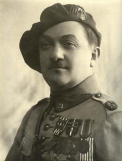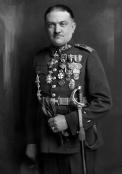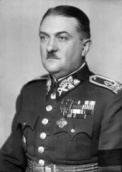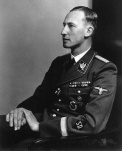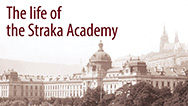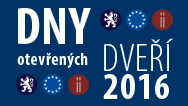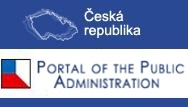Important personalities
29. 9. 2010
Alois Eliáš (29.9.1890 - 19.6.1942)
Soldier
Alois Eliáš was born on 29 September 1890 in the Prague district Královské Vinohrady. After finishing the secondary school, he began to study at the Czech Technical University and graduated in 1911 after passing the examination in geodesy. After graduation he began to work as a land surveyor for a private firm which sent him to Bosnia to work on a railway construction. During the post-war years he had to undergo a military training after which he returned to his work.
At the time of the declaration of war on Serbia, which meant the beginning of the worldwide conflict known as the Great War, he was in Prague. Eliáš had to join up the 28th Infantry Regiment and left for the east front line. However, he did not stay there long and in less than a week he was taken a prisoner in Russia on 28 August 1914. In order to have full picture, it is necessary to add that three quarters of a year later the entire regiment of his followed him. The core of the 28th infantry regiment voluntarily went over to the Russian captivity in April 1915. During his captivity Eliáš returned to his former profession of and worked as a geodesist on various railway constructions in Russsia.
In 1917 Eliáš learnt on the existence of Czechoslovak legions and joined them later on. He completed a NCO course in Borispol and then he was dispatched with a transport of other legionnaires to France. Thus, he escaped the fate of other soldiers who was not enabled to leave Russia and they had to fight out their way home in struggles of the Russian Civil War. In France Eliáš was sent to the officer school at St. Maixent and later he passed out as a second lieutenant and was assigned to the 21st Czechoslovak Regiment as a platoon commander. With this unit he got to the front line where proved his abilities as a commander and therefore he was quickly promoted. In autumn 1918 he was actively involved in the Terron Battle and in the Battle on the Aisne. For his bravery and commanding skills, he was awarded the French Croix de Guerre (Cross of War) and a medal of Legion of Honour.
The 21st Regiment was transferred to the newly born Czechoslovakia in January 1919 and was immediately involved in struggles against Poles in the Český Těšín region and then against Hungarians in Slovakia. After the return from Slovakian struggles, for which he was awarded the Czechoslovak Cross of War, Eliáš intended to return to his civil profession. However he was persuaded by his colleagues to remain in the army. He became a professional soldier a held the rank of major. At the beginning of 1920 he was appointed as a provisional commander of the 21st Infantry Regiment in Čáslav. The stay in this garrison reflected markedly in his personal life. He met Jaroslava Kosáková there and six months later he got married with her. The dowry of his wife substantially improved his social situation as he himself came from a craftsman's family.
Eliáš also promoted on the carrrier ladder. A former commander of his transport to Russia and then a commander of a military unit in France General Husárek became for a short time a Minister of Defence and chose Eliáš as his aide-de-camp. He begun to be viewed as a promising officer and was chosen to study at the French Military Academy. Just before his departure to France the mobilization had been declared, the purpose of which was to prevent the last Hapsburg Charles I from returning to the Hungarian throne. Eliáš was a Chief of the Staff of the 1st Division.
Studies in France significantly accelerated the Elias’s carrier. He worked in various positions in the General Staff and was extraordinarily promoted to the rank of Brigadier General. For his abilities and intelligence, he was chosen as an army expert to the Czechoslovak delegation at the Disarmament Conference in Geneva where he supplied the Minister of Foreign Affairs Edvard Beneš with expert opinions. After his return he became a commander of 2nd Brigade in Chomutov and then a commander of the 3rd Division in Litoměřice. In 1936 he was promoted to the rank of a General of Division, which was the second highest army rank in the time of the First Republic, and became a commander of the V. Army Corps in Trenčín. At that time the President Edvard Beneš was said to consider him as a future possible Chief of the General Staff. But it did not happen because of animosity and jealousy among other generals.
Minister
After the appointment of the government of General Jan Syrový in Czechoslovak fatal days in the end of September 1938, this soldier chose Eliáš, who was familiar to him, as his deputy at the Ministry of Defence which he, as the Prime Minister, was in charge of. It was apparent that the person in charge at the Ministry of Defence was just General Eliáš, in fact. This state lasted until the demission of the government in December 1938. In the new cabinet of Rudolf Beran, Eliáš gained his own ministry portfolio and was appointed as the Minister of Transport. This ministry was a new one then and was established as a result of the merge of the Ministry of railways and the Ministry of Post and Telegraphs. Owing to this new situation in the curtailed state, it was necessary to solve number of problems and it was just the Ministry of Transport which was able to do so. On the one hand it was necessary to solve pressing problem of disrupted transport network which was caused by the annexation of Sudetenland and on the other hand it was necessary to solve the problem of unemployment caused, apart from other things, by the influx of refugees from annexed borderland. Then the Ministry of Transport started to prepare the project of a Czechoslovak motorway which was able to remove both problems.
Eliáš belonged among those who, up to the last moment, tried to save the existence of Czecho-Slovakia, which was the name of the then state. Using his position he partly initiated and supported the action against the Slovak separatists. However, this action eventually turned to the opposite effect than its initiators had believed. Nazi Germany stood up for Slovenian politicians and adherents to the common state were defeated. Nazis used the action for justifying their action in former Czechoslovakia as, according to their interpretation, there were chaos and disorders.
Slovakia gained a consent to declare independence. During the ensuing negotiation in Berlin a great pressure was exerted to the President Hácha; the result was the signature of the consent with the occupation of the rest of Bohemia and Moravia. The government was not able to do anything against this act and offered demission. However, President Hácha did not accept it and thus from the government of the Second republic became a government of the Protectorate, which was officially declared by Adolf Hitler on 26 March 1939.
As early as he was the Minister of Transport, Eliáš was involved in a great change in the transport sphere. In the time of the First Republic, cars drove on the left-hand side of Czechoslovak roads. The Beran´s cabinet was preparing a change which was accelerated by the arrival of Germans. It was also necessary to solve much more burning problem. In spite of his pro-German activities dating back to early 1930´, he did not gain the confidence of Germans and it was necessary for him to leave. It was just Alois Eliáš who was chosen for his position. It was rather surprising as Germans knew about his involvement in legions. Perhaps it was due to the fact that Konstantin von Neurath became the Reich Protector who had known Eliáš as a diplomat at the Disarmament Conference in Geneva.
At the Head of the Government
Eliáš accepted his commission to be a prime minister. With the benefit of hindsight, it is necessary to admire that decision of his. It must have been clear to him that he would be either condemned by his own nation for collaboration or by Germans for defending interests of Czech people. Eliáš tried to hover at the edge if it was possible. He did not agree with the occupation, but on the other hand he did not want to initiate some German repressions against the Czech nation by a statement or action of his. He realized that about the fate of Czechoslovakia it will be decided in a foreign or home environment and that it was primarily necessary to avert a wholesale carnage. Forces were to be preserved for the moment convenient for an effective action against Germans.
The government was officially appointed by the State President Hácha after the consent of the Reich Protector on 27 April 1939. The general public accepted the appointment of Eliáš with relief as there were serious fears that at the head of the government might have stand some of Czech fascists. Eliáš considered as his main task to save what was possible to save and in case that a fascist directive was not able to be averted he wanted to hamper the entire process of its implementation.
Since the first days of occupation a home resistance movement began to be formed. Unfortunately, expectations of some members of the movement concerning their activities were rather naive. Germans were quite different opponent than the Austrian authorities in the period of the First World War. Lots of resistance fighters paid dearly for their experience and lost their lives. It is surprising that the information on the Eliáš´s involvement in the resistance movement did not leak right in the very beginning. He became a member of so-called Council of Seniors of a military resistance movement group "Defence of the Nation". The staff of this organization had its seat in the premises of the Presidium of Ministerial Council which was similar institution like the Office of the Government nowadays. The Prime Minister also maintained radio connection with newly formed exile government in London and was trying to follow their instruction. However, it was not always possible as the exile government had rather distorted notion on the everyday life in the protectorate and its policy.
The protectorate government, which should have been an autonomous one, was in fact a government subordinated to Germans, and Germans did not even try to pretend observation of a formally corect procedure and ordered what they wanted without knowledge of the government. The position of the government became gradually more complicated. Eliáš even considered his resignation several times but was discouraged from doing that because there were fears that a collaborator would get his position. We cannot deny that Eliáš tried to avert the worst actions. He refused to swear to Adolf Hitler, he strongly protested against the German action on 28 October when Czech inhabitants spontaneously celebrated the banned national holiday as well as against the action after the funeral of student Jan Opletal at Czech universities on 17 November 1939. However his interventions, demands and intercessions at occupation authorities were not often successful.
Eliáš was in particular tortured by forced manifestations of loyalty to the Third Reich which could have undermined the activities of the exile representation.. The government in London was monitoring that and was constantly discouraging the protectorate officials from those manifestations. Unfortunately, the exile government did not understand what the position of the protectorate government was like in fact. In 1940, after the fall of France and breakdown of hopes for quick end of the war, even certain cooling of relations between the exile and protectorate government took place because President Hácha was forced to congratulate Hitler on the German victory. After some time the situation improved.
At that time clouds began to be gathering over him and the situation worsened after an affair when one of members of his government – Ladislav Feierabend - escaped to avoid arrestment by Gestapo. Eliáš called on him to do that and even was even covering him for some time. The situation further worsened after the arrestment of the Lord Mayor of Prague Otakar Klapka who knew a lot about the Eliáš´s actions concerning the support of families of emigrants and arrested persons, on secret subventions to the resistant movement and providing information to resistant movement organization through secret messengers and on his contacts with Edvard Beneš. Especially it was Karl Herman Frank, the Police President and the second most powerful man of the occupation administration, was gunning for him. Frank aimed to strengthen powers of the occupation authorities and the Eliáš´s resistance to his orders really enraged him. Frank also initiated shadowing of Eliáš and the work on his indictment.
At that time Eliáš was also involved in a significant action of the resistance movement – the removal of activist journalist. These collaborationists were received by Eliáš and during the audience they were offered poisonous sandwiches. The most prominent journalist, editor of "České slovo" daily, eventually died of the poisoning. Thus the Czech collaborationist journalism was got rid of one of the most prominent representatives.
The turn of the situation was the removal of Konstantin Neurath from the position of the Reich Protector. It was Reinhard Heidrich who was appointed to this position and he was decided to make short work with the Czech resistance movement. In the framework of measures taken, also Prime Minister Eliáš was arrested. After that, President Hácha formally dismissed him from the position of the prime minister. During the ensuing interrogations at Gestapo, Eliáš was allegedly treated correctly and the former general did not disclosed anything which could compromise his resistant movement collaborators and said only what Germans had already known. Several days later a speedily arranged lawsuit was held and Eliáš was sentenced to death. The entire lawsuit was trumped-up as it had been decided before about the punishment.
The last months of his life, the former Prime Minister spent in the prison in Pankrác. The execution was postponed and Eliáš had a status of a prominent prisoner. He managed to send several secret messages to his family. It was the death of somebody else which decided on the death of Alois Eliáš. Reinhard Heidrich was that person. After the assassination performed by parachutists dispatched from the Great Britain, the occupation authorities decided to vigorously frighten the Czech nation. Parts of that warning were also executions of number of condemned persons and former Prime Minister was among them. His life was ended on 19 June 1942 at the range in Kobylisy. He was brave until the last moment; he was calm and placid. Thus, after 52 years the life of a man about whom it was not possible to speak for more than 40 years, with the exception of three postwar years when he was posthumously promoted to the rank of Army General. Communists called him a collaborationist. His name was fully rehabilitated as late as in 1989. In 2002 he was decorated in memoriam with the highest honour of the Czech Republic – the Order of the White Lion. In 2006 his remains were laid with military honours in the National Memorial on the Vítkov Hill in Prague.
